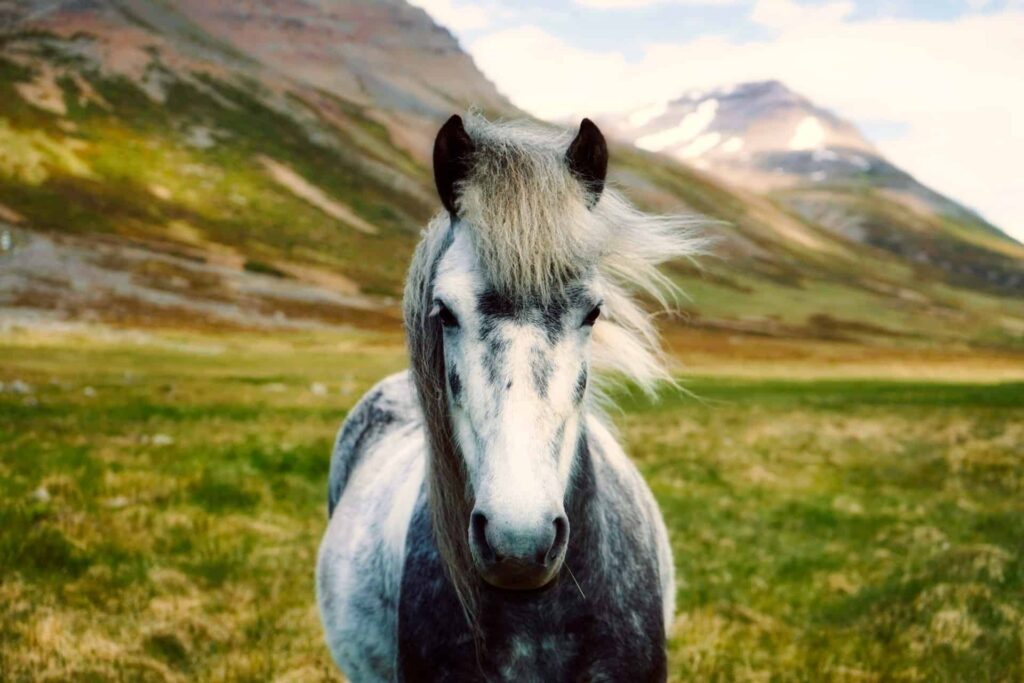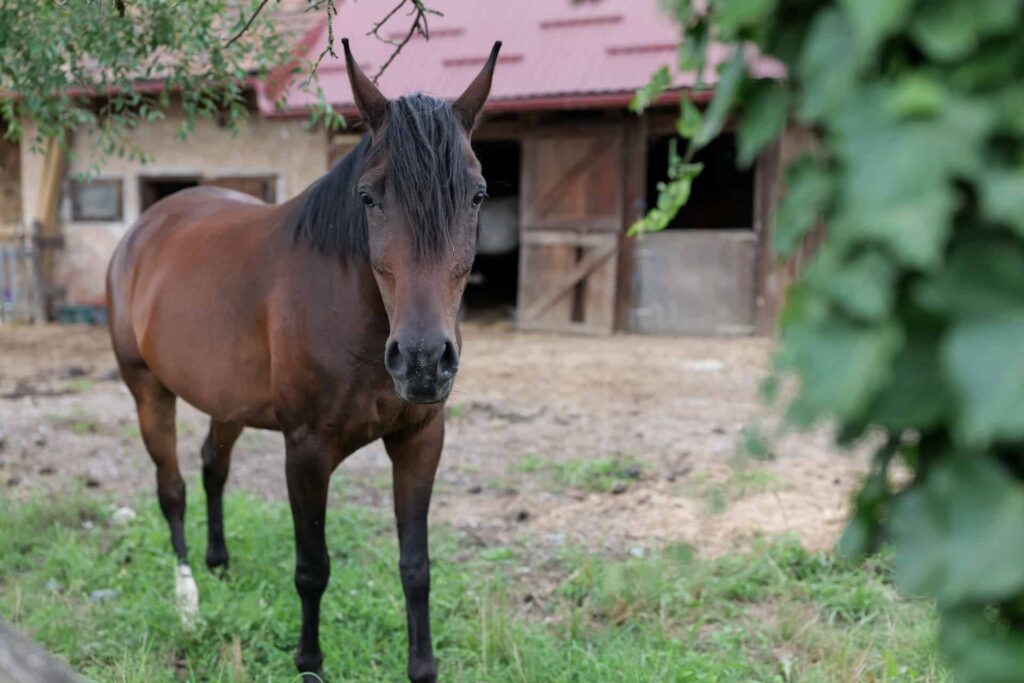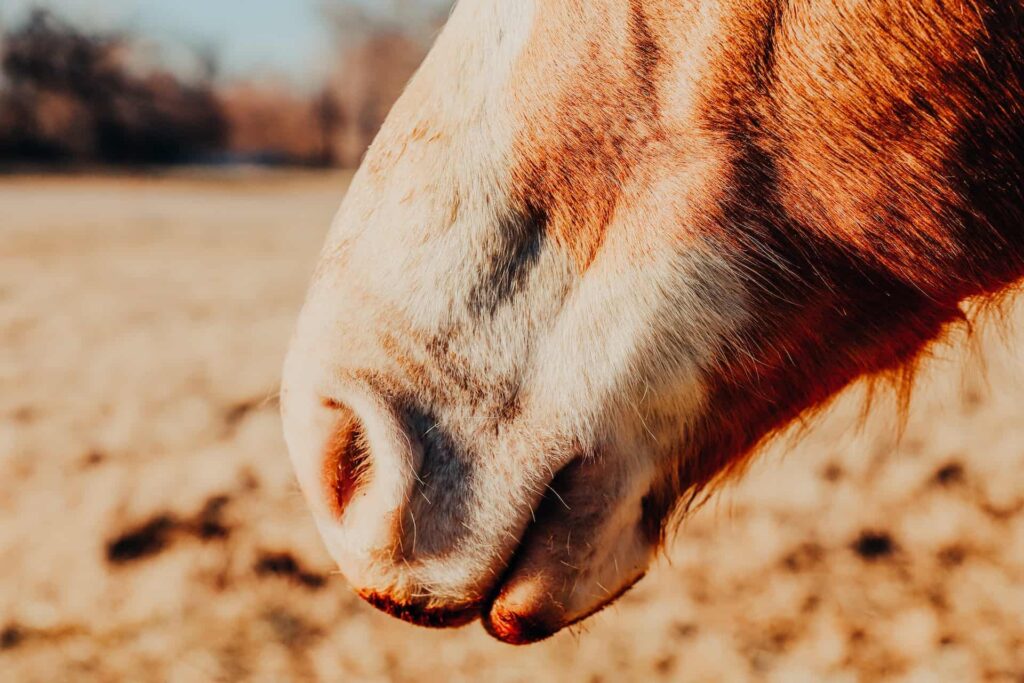Weight loss in older horses is a common concern among horse owners and caretakers. As horses age, they may experience various health issues and changes in their bodily functions, making it important to understand the causes of weight loss and take appropriate measures to maintain their overall well-being. Identifying the possible reasons for weight loss in older horses and employing effective management strategies can help provide these animals with a comfortable and healthy life during their golden years.
Various factors contribute to weight loss in older horses, including dental problems, reduced digestive efficiency, and underlying diseases. Regular health check-ups, proper dietary modifications, and general care measures play a crucial role in managing older horses’ weight and ensuring they thrive in their environments. Timely intervention and consultation with a veterinarian can further help diagnose and address any issues contributing to weight loss in geriatric horses.
Key Takeaways
- Weight loss in older horses may stem from dental problems, poor digestion, or other health issues.
- Proper nutritional management and general care are vital to maintaining the well-being of geriatric horses.
- Consulting a veterinarian for assessment and diagnosis is crucial for addressing weight loss in older horses.
Understanding Weight Loss in Older Horses
Weight loss in older horses is a common concern among horse owners and caretakers. As horses age, their body systems undergo various changes, making them more susceptible to health issues that can lead to weight loss. It’s helpful to understand the reasons behind this natural process to manage the health of older horses effectively.
One factor affecting weight loss in older horses is the deterioration of their digestive system. As horses age, their teeth may become worn or loose, making it difficult for them to break down and process food properly. This can lead to reduced nutrient absorption and, ultimately, weight loss. Additionally, the efficiency of their digestive system decreases, making it harder for them to extract vital nutrients from their feed.
Another aspect to consider is the effect of body condition, body weight, and adiposity on inflammatory cytokine responses in old horses. Horses that experience weight loss, body fat loss, and body condition loss during a particular period may have altered cytokine responses. These inflammatory responses can affect the overall health status of older horses, contributing to weight loss.
The Body Condition Score (BCS) is a practical tool used to assess the overall body condition of a horse. A healthy adult horse should have a BCS between 4 and 6 on a scale of 1 to 9, with 1 being emaciated and 9 being extremely obese. An older horse experiencing weight loss might have a lower BCS, requiring proper nutritional management to maintain optimal health.
Chronic diseases, such as Cushing’s syndrome, can also contribute to weight loss in older horses. This metabolic disorder is characterized by an excess of cortisol, a naturally occurring hormone in the body. High cortisol levels can lead to decreased insulin sensitivity, weight loss, and other complications. Early detection and appropriate management can minimize the impact of such health issues on older horses’ body condition.
In conclusion, it is crucial for horse owners and caretakers to monitor the body condition of their older horses regularly. By understanding the factors that contribute to weight loss in geriatric horses and implementing appropriate dietary and management strategies, owners can ensure their horses maintain a healthy weight and overall well-being throughout their golden years.
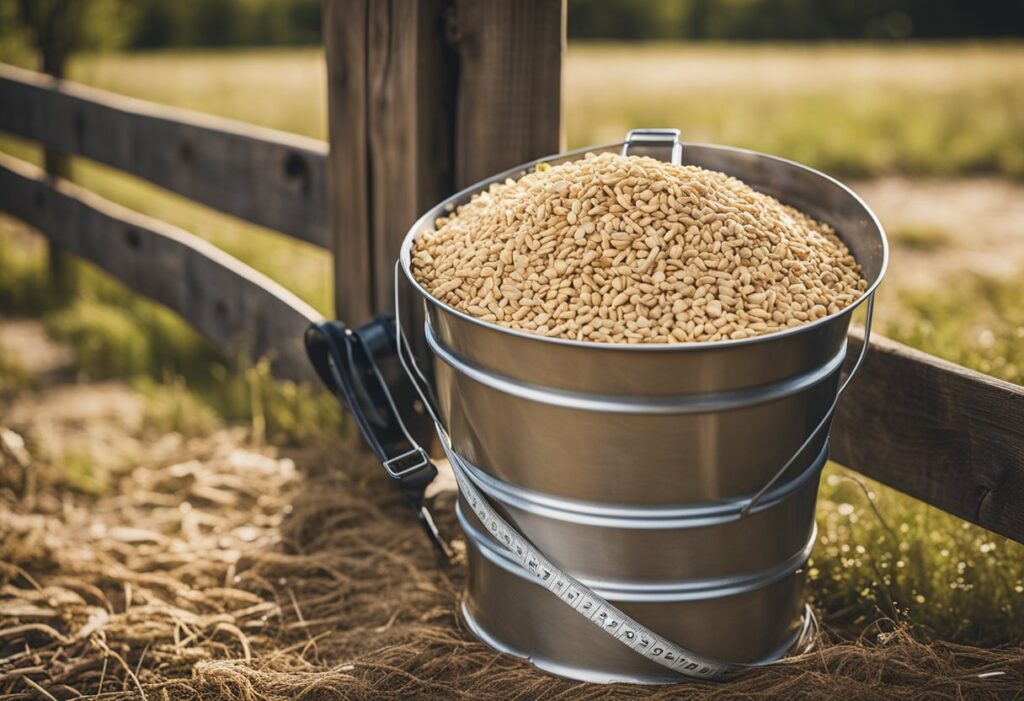
Common Causes of Weight Loss
Dental Problems
One of the primary causes of weight loss in older horses is dental problems. As horses age, their teeth undergo natural wear and tear, which can lead to issues with their dentition. Tooth loss, abnormal wear patterns, and sharp edges on cheek teeth can result in pain and difficulty chewing. Older horses may require more frequent dental examinations by a veterinarian to identify and address these issues. Proper dental care ensures that horses can effectively chew and digest their food.
Medical Conditions
Various medical conditions can contribute to weight loss in older horses. Some common causes include lameness, inflammation, and arthritis, which can result in decreased mobility and activity levels. Hyperthyroidism, pituitary pars intermedia dysfunction (PPID), liver disease, or chronic infections can also impact a horse’s metabolism and overall health, leading to weight loss. A thorough veterinary examination, including diagnostics, is necessary to pinpoint the underlying medical issue and implement an appropriate treatment plan.
Dietary Issues
Older horses may require adjustments to their diet to maintain a healthy weight. As their metabolic needs change, balance their intake of hay, grain, forage, and complete feed. An ideal diet for these horses should provide adequate calories and fiber while being easily digestible. Feeding options such as beet pulp, vegetable oil, grass hay, complete feeds, or concentrates can help meet their nutritional requirements. In some cases, switching to a high-calorie alternative like rice bran, alfalfa hay, hay cubes, or different forages (such as timothy) may be necessary.
Parasitic Infections
Parasitic infections can be a significant contributor to weight loss in older horses, as they can interfere with the horse’s ability to absorb nutrients. A regular deworming schedule and a comprehensive parasite control program should be implemented to prevent these infections. Veterinarians may recommend fecal egg counts to determine the extent of parasitic infections and guide treatment decisions. Monitor for tapeworms and other parasites, as they can have a significant effect on a horse’s overall health and weight maintenance.
Assessment and Diagnosis
Physical Examination
In order to diagnose the cause of weight loss in older horses, a thorough physical examination should be conducted by a veterinarian. Key aspects of the examination include body condition scoring, dental evaluation, and observing the horse’s movements and gait.
Body condition scoring (BCS) is a tool for assessing the overall health status of underweight horses. By using a weight tape, veterinarians can estimate the horse’s body weight and monitor any changes over time. Apart from assessing general body condition, special attention should be given to dentition since tooth loss, sharp points, and other dental issues can lead to difficulties in chewing, quidding, or even diarrhea, ultimately causing weight loss in older horses.
Evaluating the horse’s gait and traction can provide insights on the presence of pain or discomfort that could affect the animal’s ability to consume and utilize energy sources. Observing any difficulty or abnormality in movements can be valuable information for proper diagnosis and treatment planning.
Laboratory Investigations
Upon completion of the physical examination, veterinarians may recommend further laboratory investigations to help pinpoint the cause of weight loss in the old horse. Some common laboratory tests include bloodwork, kidney function tests, ultrasound, endoscopy, and biopsies.
Bloodwork provides a detailed overview of the horse’s systemic health, including potential metabolic disorders or underlying medical conditions that could contribute to weight loss. Additionally, assessing kidney function is necessary as chronic renal failure in horses can be associated with weight loss and other clinical signs.
Ultrasound imaging can be useful in evaluating the horse’s gastrointestinal and reproductive system, identifying any potential abnormalities, masses, or injuries that may be preventing efficient nutrient absorption or causing discomfort during eating. Endoscopy is another diagnostic tool that can be utilized to examine the horse’s esophagus, stomach, and respiratory tract, further narrowing down the possible causes of weight loss in older horses.
In some cases, biopsies may be required to diagnose specific conditions, such as equine motor neuron disease or metastatic melanoma, which could contribute to weight loss and deteriorating health. Biopsies can provide valuable information about tissue abnormalities and aid veterinarians in determining the appropriate treatment plan.
In conclusion, the process of assessing and diagnosing weight loss in older horses should involve a combination of a thorough physical examination and appropriate laboratory investigations. By properly identifying the underlying causes, veterinarians can then develop and implement an effective treatment plan for the horse’s improved health and well-being.
Nutritional Management for Weight Gain
Dietary Adjustments
In order to manage weight gain for older, underweight horses, dietary adjustments need to be made to increase energy, protein, and fat intake. Providing a balance between forage and grain in their diet can help improve energy intake. Including higher-calorie forage options like chopped hay or hay cubes can also be beneficial. Using complete feeds and fat supplements such as rice bran and vegetable oil can further enhance the calorie content in their diet.
Supplementation
Older horses may have reduced nutrient absorption, making it necessary to provide them with additional supplements. These may include vitamins, minerals, and fat supplements. Vitamins E and C are particularly important for senior horses, as they aid in maintaining muscle and bone health. Incorporating complete feeds, which contain essential nutrients and fiber, can be effective in meeting the older horse’s nutritional requirements.
Feeding Practices
Implementing proper feeding practices is a significant aspect of nutritional management for weight gain. Older horses may need more frequent, smaller meals to help with digestion and absorption of nutrients. Ensuring that they have access to clean and fresh water at all times can encourage the consumption of a more balanced diet. Additionally, monitoring body condition scores and making adjustments to their diet accordingly will aid in maintaining a good body condition.
Maintaining Proper Body Condition
Adequate energy intake plays a vital role in maintaining the topline and overall health of older horses. Regularly assessing and adjusting the horse’s diet based on their body condition score can help maintain an ideal weight. Providing a diet high in calories, protein, and fat can contribute to maintaining proper body condition in underweight horses. Additionally, senior feeds specially formulated for older horses can be valuable in ensuring their energy requirements are met.
Maintaining Hydration
Hydration is crucial for older horses, especially when they’re consuming higher amounts of dry feed, like hay cubes and chopped hay. Ensuring access to clean, fresh water helps horses stay hydrated and encouraged to eat an appropriate diet. Adequate hydration also plays a part in nutrient absorption and maintaining good body condition. In some cases, soaking hay or feeds can help increase water intake and make it easier for older horses to consume and digest their food.
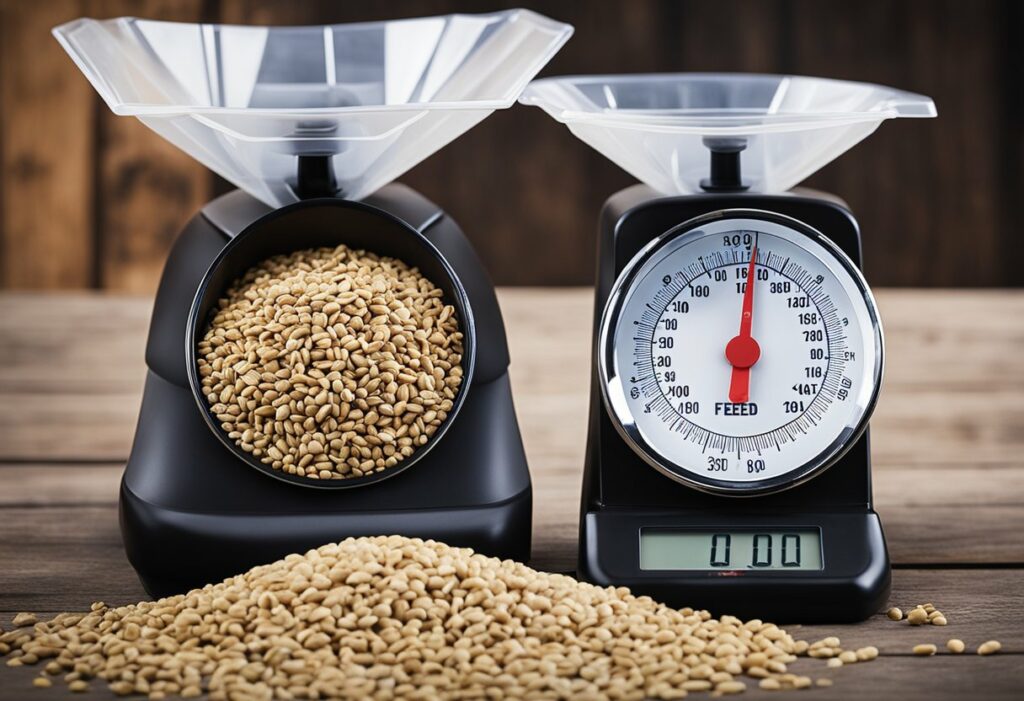
General Care and Management
Dental Care
Proper dental care is crucial for older horses, as they can experience difficulties in chewing, which may lead to weight loss. Regular check-ups and teeth floating can help maintain optimal dentition in aged horses and prevent pain. It is important to consult a veterinarian to ensure the horse’s dental health is well-maintained.
Parasite Control
Parasite control is part of managing older horses, as they can be more susceptible to the adverse effects of internal parasites. Regular deworming and fecal examinations can help detect and alleviate these issues. Consult with your veterinarian to establish an appropriate deworming schedule for your senior horse.
Vaccination
Older horses still require proper vaccinations to protect them against various diseases. Maintain an up-to-date vaccination schedule, taking into account the horse’s specific needs and regional risks. Consult your veterinarian to tailor a vaccination plan for your senior equine.
Foot and Joint Care
As horses age, they are more prone to joint pain and lameness, which can impact their body condition score and overall health. Regular foot care, including trimming and shoeing, helps maintain hoof health and may reduce the risk of laminitis. Additionally, joint supplements and pain management options should be discussed with your veterinarian to keep your older horse comfortable and mobile.
Shelter and Environmental Considerations
Proper shelter and turnout are important factors in caring for senior horses. Providing a safe and comfortable environment with protection from harsh weather conditions can prevent stress and improve the horse’s well-being. Regular turnout allows older horses to exercise, strengthen their joints, and maintain a healthy body condition. However, monitor the horse during turnout and adjust for changes in weather to ensure their safety and comfort.
When to Consult a Veterinarian
Older horses, like any other aging animals, may experience weight loss due to a variety of factors. It is crucial to monitor the health of these horses and consult a veterinarian in certain situations. Identifying the correct time to seek a veterinarian’s expertise can contribute to maintaining an older horse’s overall well-being.
One of the key indicators to consult a veterinarian is when a horse exhibits continuous weight loss despite proper diet and exercise. Weight loss in older horses might be a symptom of an underlying medical condition that requires professional diagnosis and treatment. In such cases, a clinical exam conducted by the veterinarian will help identify the root cause of the problem.
Another sign to consult a veterinarian is when the horse experiences lameness or difficulty in movement. Lameness in older horses can be due to degenerative joint diseases or injuries. Veterinarians possess specialized knowledge and tools to diagnose the cause of lameness and recommend appropriate treatments for the horse’s specific condition.
Monitoring the general behavior of older horses is also crucial. If a horse exhibits frequent signs of discomfort, colic, or unexpected changes in behavior, it’s time to involve a veterinarian. These changes might be related to pain or a distressing medical condition requiring professional attention.
It is necessary to recognize when an older horse requires veterinary consultation. Key factors to consider include continuous weight loss despite proper care, lameness or movement difficulties, and sudden changes in behavior. Timely consultation with a veterinarian can significantly contribute to maintaining an older horse’s health and quality of life.
Related: Horse Health
Frequently Asked Questions
How can I help my senior horse gain weight?
To help your senior horse gain weight, ensure they receive adequate dietary intake and address any dental problems that may be causing them difficulty in chewing and digesting food properly. Regular dental checkups and teeth maintenance can significantly help in this aspect. Along with a well-balanced diet, consider providing them with easily digestible feeds and incorporating a gradual increase in the amount of feed over time.
What is the best feed for older horses experiencing weight loss?
The best feed for older horses experiencing weight loss should be high in fiber, easily digestible, and nutritionally balanced. Choose feeds that are specifically formulated for senior horses, as they often contain additional nutrients to support overall health. In addition, consider adding fat supplements such as vegetable oil or rice bran to boost calories without increasing the volume of feed. Always consult with your veterinarian or equine nutritionist to tailor the most appropriate diet according to your horse’s specific needs.
Are there any seasonal factors that affect weight loss in older horses?
Seasonal factors can definitely affect weight loss in older horses. During the colder months, their energy demands may increase to maintain body temperature and keep warm. Older horses may require additional calories in their diet during winter to compensate for this increased need. Conversely, in warmer months, excessive heat and humidity may lead to decreased appetite, and older horses might require adjustments in their feeding and management to maintain optimal weight.
Could a medical condition be causing my older horse to lose weight?
Yes, medical conditions can cause weight loss in older horses. Common issues include dental problems, gastrointestinal parasites, hormonal imbalances, and metabolic syndromes. If your senior horse experiences sudden, unexplained weight loss, it is essential to consult with a veterinarian as soon as possible to determine the underlying cause and establish an appropriate treatment plan.
How does age-related lethargy impact weight in senior horses?
Age-related lethargy can have a direct impact on a senior horse’s weight management. Decreased activity levels may lead to reduced muscle mass and an increased risk of obesity or weight gain. On the other hand, lethargy may also be a symptom of an underlying health issue causing weight loss. Regular checkups with a veterinarian can help identify any health problems that might be causing your horse to be lethargic and address them accordingly.
What changes in physical appearance can I expect in an aging horse losing weight?
In an aging horse losing weight, you may notice visible changes in their physical appearance, such as a swayback, protruding ribs, loss of muscle mass, hollows around the hips and withers, and a bony or angular appearance. Observing and monitoring these changes can help you identify weight loss early and take action to remedy the underlying cause. Regular body condition scoring and working closely with your veterinarian or equine nutritionist can help maintain your senior horse’s overall health and well-being.
Last Updated on October 9, 2023 by Nate Dewsbury
